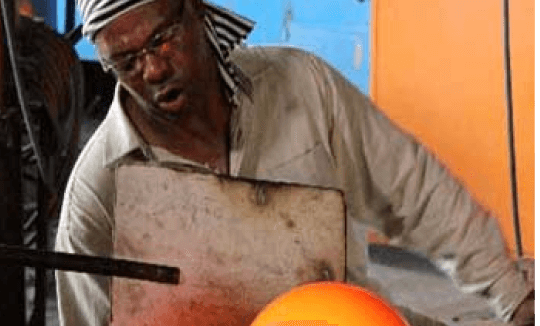Ngwenya Glass
Classic design, wholly recycled glass and a happy community

- Location South Africa
- Working on Recycling glass to create beautiful products
The story of Eswatini’s Ngwenya Glass could have ended in the 1980s, if one family hadn’t been so attached to a collection of glass elephants.
Back in 1979, a Swedish charity working in what was then Swaziland, set up a glass blowing factory. There was machinery, equipment, training from some of the world’s leading glass blowers. Everything was working neatly and the factory, from 1981 to 1985, was entirely Swazi-run. But then the factory closed down.
It may have stayed that way. But the Prettejohn family, husband and wife Richard and Alice and their son Chas, had been fond of a range of glass elephants made by Ngwenya. The Prettejohns were then living on South Africa’s Eastern Cape and decided to investigate. They ended up buying the factory.
There was one rather large obstacle, in that none of them knew anything about glass. But there were people around them who did. The family began searching for former employees. One of these was production manager Sibusiso Mhlanga, who had trained in Stockholm under master glassblower Jan-Erik Ritzman. Sibusiso began to train others.
Ngwenya now employs 70 people. Their glass products are entirely recycled, mostly from bottles collected by those who live near the factory who are paid for their contribution. The makers have collaborated with local designers and with some of the world’s most respected glass makers, including representatives from Italy’s famous Murano.
It’s a long way to go to complete your collection of glass elephants, but it’s worked out well for everyone.
Why they are different:
Ngwenya are design stars, avoiding all the chunky, folksy cliches that often attach themselves to recycled glass products. These are presents you’ll be proud to give, or a beautiful addition to any home.
Why they are kind:
The glass is recycled, saving on raw materials and cleaning up the surrounding area. They use recycled newspaper to pack their products and - and we love this - their kiln, which requires a massive 700 litres of fuel per 24 hours - uses a blend of old motor oil and oil that’s been used by KFC.


